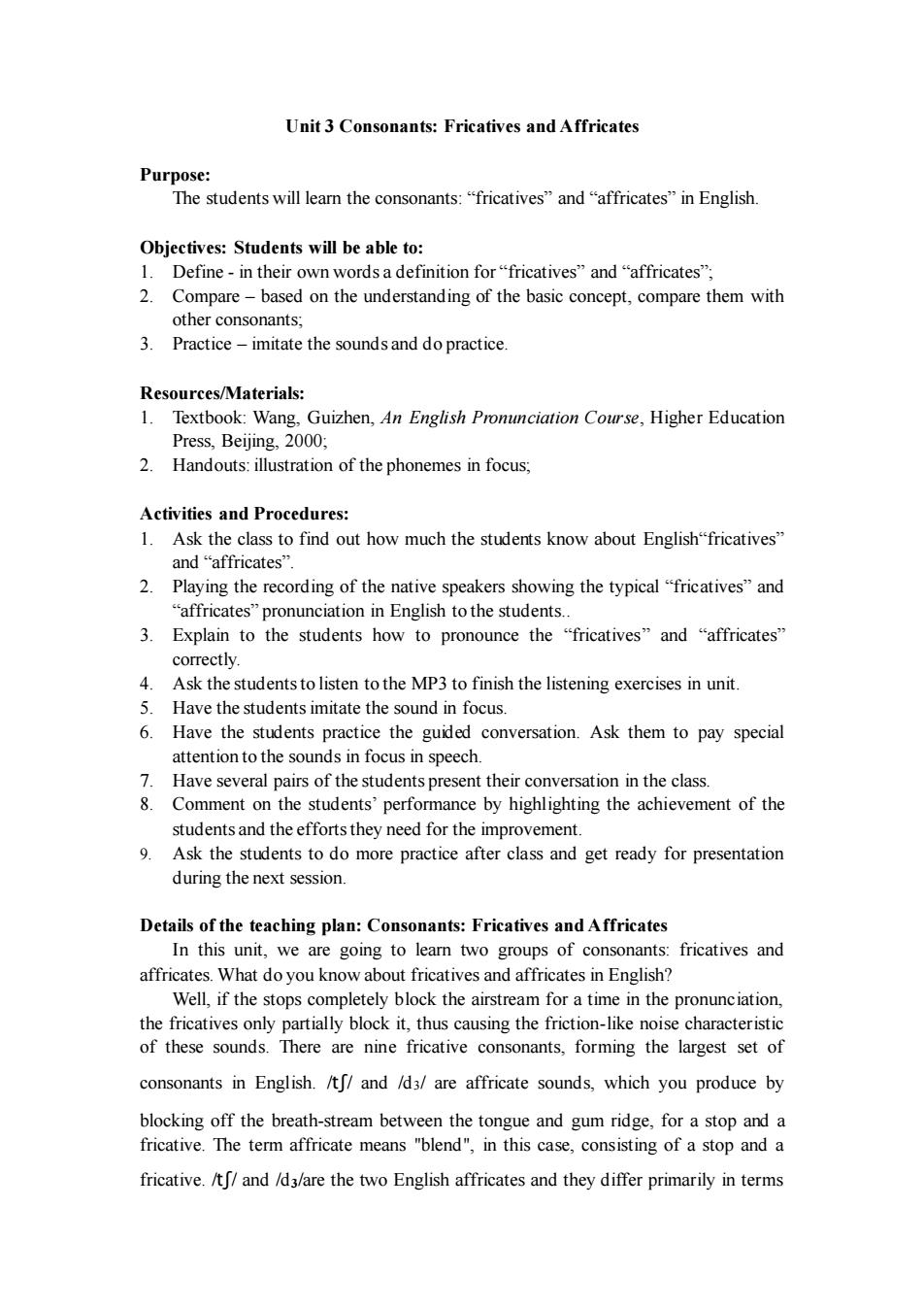正在加载图片...

Unit 3 Consonants:Fricatives and Affricates Purpose: The students will leam the consonants::“fricatives”and“affricates'”in English. Objectives:Students will be able to: Define-in their own wordsa definition for"“fricatives”and“affricates” 2. Compare -based on the understanding of the basic concept,compare them with other consonants, 3.Practice-imitate the soundsand do practice. Resources/materials Textbook:Wang. Guizhen,An English Pronnciation Course,Higher Education Press,Beijing.2000. 2.Handouts:illustration of the phonemes in focus; Activities and Procedures: 1.Ask the class to find out how much the students know about English"fricatives and"affricates' 2.Playing the recording of the native speakers showing the typical"fricatives"and "affricates pronunciation in English to the students. 3.Explain to the students how to pronounce the“fricatives”and“affricates” 4 Ask the studentstolisten tothe MP3 to finish the listening exercises in uni Have the students imitate the sound in focus. 6. Have the students practice the guided conversation.Ask them to pay special attention to the sounds in focus in speech 7 Have several pairs of the students present their conversation in the lass the s students'perfor by highlighting the achievement of the students and the efforts they need for the improvement 9 Ask the students to do more practice after class and get ready for presentation during the next session. Details of the teaching plan:Consonants:Fricatives and Affricates In this unit. we are going to leam two groups of consonants:fricatives and affricates.What do you know about fricatives and affricates in English? Well,if the stops completely block the airstream for a time in the pronunciation, the fricatives only partially block it,thus causing the friction-like noise characteristic of these sounds.There are nine fricative consonants,forming the largest set of consonants in English./tf/and /d3/are affricate sounds,which you produce by blocking off the breath-stream between the tongue and gum ridge,for a stop and a fricative.The term affricate means "blend",in this case,consisting of a stop and a fricative./tf/and /d3/are the two English affricates and they differ primarily in terms Unit 3 Consonants: Fricatives and Affricates Purpose: The students will learn the consonants: “fricatives” and “affricates” in English. Objectives: Students will be able to: 1. Define - in their own words a definition for “fricatives” and “affricates”; 2. Compare – based on the understanding of the basic concept, compare them with other consonants; 3. Practice – imitate the sounds and do practice. Resources/Materials: 1. Textbook: Wang, Guizhen, An English Pronunciation Course, Higher Education Press, Beijing, 2000; 2. Handouts: illustration of the phonemes in focus; Activities and Procedures: 1. Ask the class to find out how much the students know about English“fricatives” and “affricates”. 2. Playing the recording of the native speakers showing the typical “fricatives” and “affricates” pronunciation in English to the students. 3. Explain to the students how to pronounce the “fricatives” and “affricates” correctly. 4. Ask the students to listen to the MP3 to finish the listening exercises in unit. 5. Have the students imitate the sound in focus. 6. Have the students practice the guided conversation. Ask them to pay special attention to the sounds in focus in speech. 7. Have several pairs of the students present their conversation in the class. 8. Comment on the students’ performance by highlighting the achievement of the students and the efforts they need for the improvement. 9. Ask the students to do more practice after class and get ready for presentation during the next session. Details of the teaching plan: Consonants: Fricatives and Affricates In this unit, we are going to learn two groups of consonants: fricatives and affricates. What do you know about fricatives and affricates in English? Well, if the stops completely block the airstream for a time in the pronunciation, the fricatives only partially block it, thus causing the friction-like noise characteristic of these sounds. There are nine fricative consonants, forming the largest set of consonants in English. /tʃ/ and /d3/ are affricate sounds, which you produce by blocking off the breath-stream between the tongue and gum ridge, for a stop and a fricative. The term affricate means "blend", in this case, consisting of a stop and a fricative. /tʃ/ and /d3/are the two English affricates and they differ primarily in terms